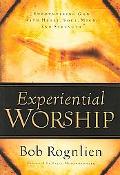 Worship is our top priority as Christians. We were made to worship. I’ve always enjoyed the statement from the Westminster Confession which reads: “Man’s chief and highest end is to glorify God, and fully to enjoy him forever.” Inasmuch as this is true, I’d like to recommend a book for your edification and enrichment on this all important topic. It’s entitled “Experiential Worship” by Bob Rognlien, NavPress, 2005.
Worship is our top priority as Christians. We were made to worship. I’ve always enjoyed the statement from the Westminster Confession which reads: “Man’s chief and highest end is to glorify God, and fully to enjoy him forever.” Inasmuch as this is true, I’d like to recommend a book for your edification and enrichment on this all important topic. It’s entitled “Experiential Worship” by Bob Rognlien, NavPress, 2005.
The author, a Princeton educated Lutheran pastor from Torrance, California, who has led his congregation in worship renewal for a number of years, defines worship as “nothing less than a personal encounter with the living God. God comes to us and we respond; the mysterious and transforming intersection is what we call worship.” Another way to talk about our response to God’s overture of love toward us, according to Rognlien, is simply “loving God.” The framework of his book is derived from the scriptural answer to life’s most compelling question, “Why am I here on the planet?” The answer is found in the words of the Great Commandment of Mark 12:30 – “Love the Lord your God with all your heart and with all your soul and with all your mind and with all your strength.” For Rognlien, worship is essentially loving God with our whole being – heart, soul, mind, and body.
Worship With All Your HEART
Culturally, we think of the heart as having to do with our human emotions. Valentine’s Day comes to mind. However, biblically speaking, the heart is the seat of our human will, the place where human intention resides. To love God (or worship) with all your heart evokes the idea of choice – intentionally choosing, from among many objects of potential allegiance, to worship God.
Worship With All Your SOUL
Biblically, the soul is not the non-material part of us that lives for eternity after our bodies die – that’s more correctly the human spirit. “Soul” applies to the emotional aspect of human nature. Thus, to love God, (or worship) with all your soul – involves our emotional being, our feelings.
Worship With All Your MIND
According to Rognlien, the biblical writers use the term “mind” to describe not just our ability to process information, but “a consciousness that enables us to derive meaning and wisdom from information.” Thus mind emphasizes “knowing” that is both fact-based and relational. Worship should include a cognitive function that leads to spiritual meaning.
Worship With All Your Strength
According to the author, “strength” in Scripture is often connected to the physical aspect of human existence.” Thus, loving God (or worship) includes the proper use of our bodies “to give expression to the thoughts, feelings, and decisions that reflect the response of the whole person to God.”
After developing this biblical framework from which to understand the essence of worship, Rognlien suggests that our experience of worship should move from “encounter with God” to “transformation by God.” Rognlien asks “What is it that makes an encounter with God life-changing? His answer is both challenging and convicting. He says, “The question is not whether God is present to us; the question is how present we are to God.” He concludes this thought by saying, “Does the particular form of our worship really help people to be present to God in a transforming way?” The reason worship may not be transforming us in many of our worship services “is because we are each offering our own derivative portion of worship rather than a full range of experiences as envisioned in Jesus’ Great Commandment.”
In other words…
- The Methodist/Baptist/Evangelical camp emphasizes “heart worship” with its focus on choice and the volitional.
- The Pentecostal/Charismatic segment of the church emphasizes “soul worship,” which accents powerful feelings and emotions.
- The Lutheran/Reformed/Bible Church sector of the church elevates “mind worship” with its emphasis on clear understanding and the more cognitive aspects of the faith.
- And finally, the Orthodox/Catholic/Anglican traditions of Christendom, have a dominant focus on “strength worship,” with emphasis on the physical aspects of worship such as “specific acts” and a strong appeal to the senses in worship practice.
Rognlien’s point is that each tradition has a comfort zone in which they feel at home when it comes to worship practice, which doesn’t allow full expression of the other elements. This reality leads to a stunted experience of worship that diminishes the sense of encounter with God, which therefore tends to limit the transformative potential of worship for the Christian. Although he calls each tradition to a reality check, Rognlien is not harsh or condemning in his analysis. Rather, from a grace perspective he shares his longing that worship would become more transformational across denominational lines for the glorification of God and the advance of his kingdom. A good portion of the book is devoted to practical helps on how to incorporate elements of heart, soul, mind, and strength into a worship that engages the whole person in an encounter with God that will hopefully become transformational for the worshiper. As someone who longs to become “more present to God” in my worship, in response to the fact that He is so present to me, I found this book to be provocative, insightful, inspirational, and helpful, and I highly recommend it to you. – MAJ
